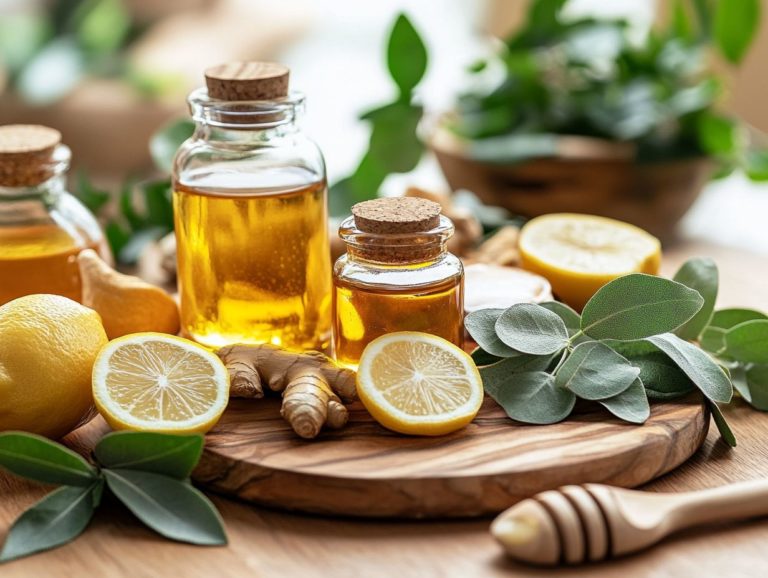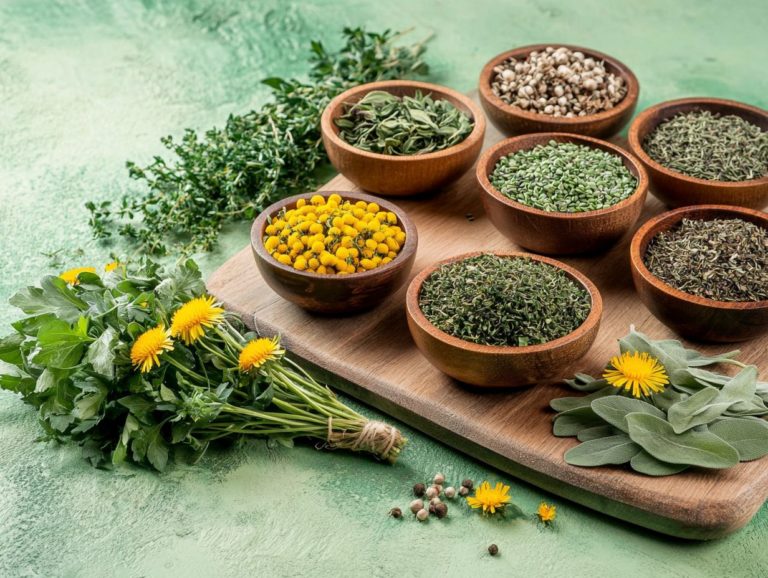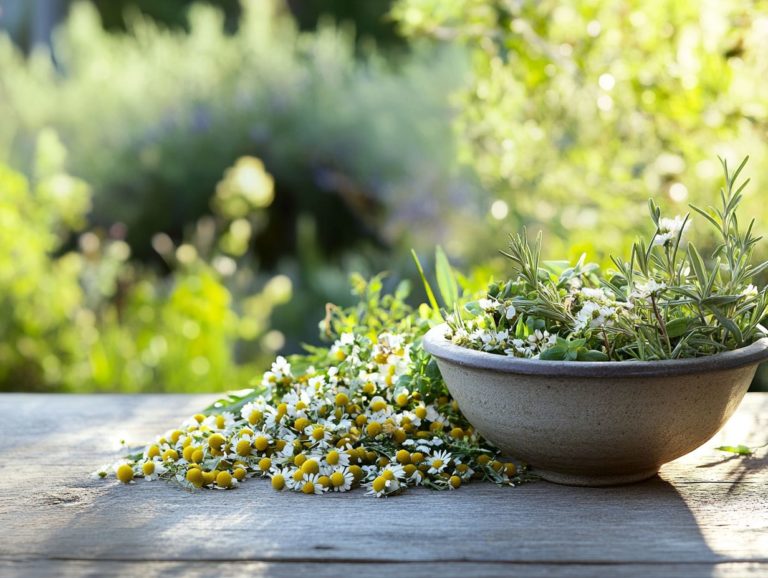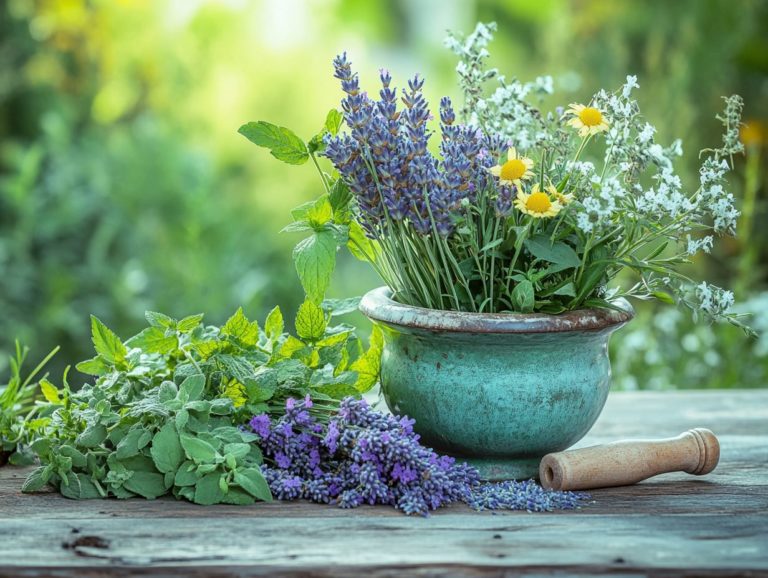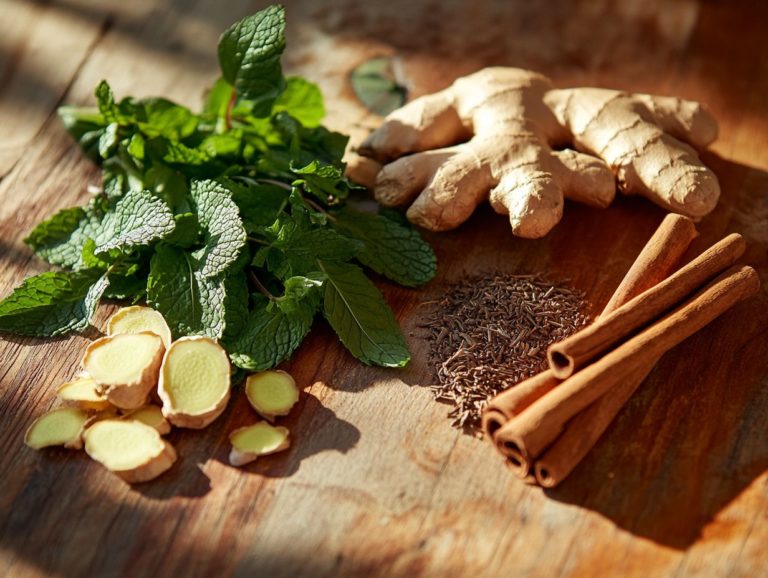Herbs That Help with Mood Swings
Mood swings can feel like a rollercoaster ride unpredictable and often frustrating affecting your daily life and overall well-being.
Delving into the connection between herbs and emotional health reveals a treasure trove of natural remedies that may help stabilize your mood. This article will guide you in understanding the causes of mood swings, introduce you to specific herbs renowned for their balancing effects, and offer practical tips on seamlessly integrating these plants into your daily routine.
You will also explore potential side effects and learn how to safely combine herbs with other treatments for a comprehensive approach to mood management. Unlock the secret of nature to achieve emotional balance!
Contents
Key Takeaways:
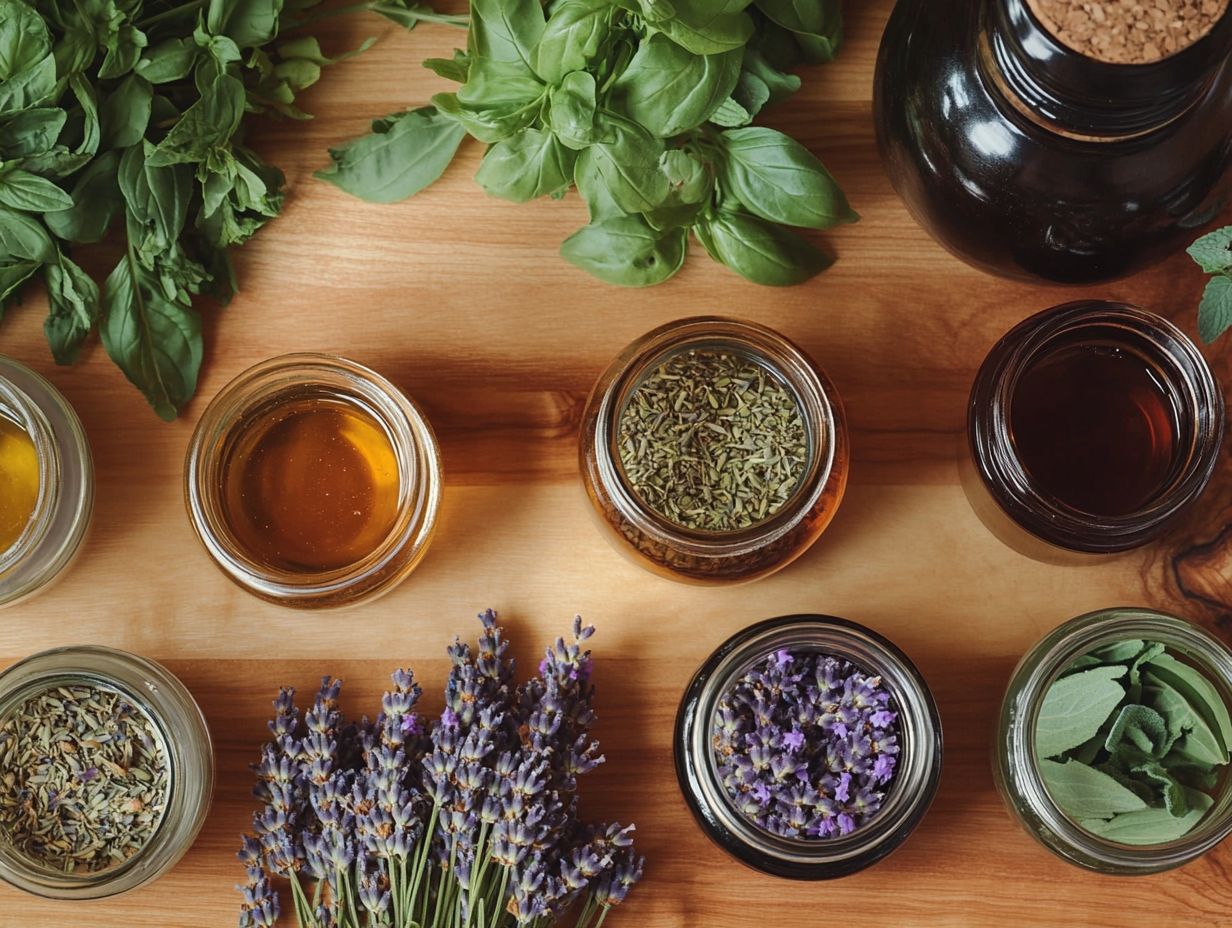
- Incorporating herbs into your routine can help balance mood swings caused by various factors, such as hormonal changes or stress.
- Natural remedies, such as St. John’s Wort and Kava Kava, can be effective in managing mood swings without the potential side effects of prescribed medication.
- When using herbs for mood swings, it is important to be aware of potential side effects and interactions with other medications. Consult with a healthcare provider and follow recommended dosages to safely incorporate herbs into your routine.
The Connection Between Herbs and Mood Swings
The relationship between herbs and mood swings is becoming increasingly compelling, particularly as you seek natural solutions for mood problems like depression, bipolar disorder, and anxiety.
Research from respected universities such as the University of Minnesota, along with findings published in the American Journal of Preventive Medicine, illuminates the potential benefits of herbal remedies like St. John s Wort and Kava Kava, as well as mood-boosting supplements like Omega-3 fatty acids and SAMe, a compound found in the body that may help with mood. Additionally, exploring how herbal tea can improve your mood can provide further insights into natural ways to enhance emotional well-being.
This article is designed to delve into the efficacy of these mood-enhancing alternatives and their impact on alleviating depressive symptoms.
Understanding Mood Swings and Their Causes
Understanding mood swings and their underlying causes is crucial for grasping the complexities of mood disorders, such as depression and bipolar disorder, which can profoundly affect your quality of life.
Factors contributing to mood swings can vary widely, encompassing hormonal fluctuations, chronic stress, and lifestyle choices like exercise and nutrition that may either worsen or improve your symptoms. Exploring herbal solutions for seasonal affective disorder can also provide additional support in managing these fluctuations.
These challenges are often shaped by a blend of biological, psychological, and environmental influences. For example, genetics can significantly predispose you to mood disorders, while external factors such as traumatic experiences or toxic relationships can trigger episodes.
Psychological elements, like cognitive distortions (thinking patterns that can lead to negative feelings) and low self-esteem, can further complicate your emotional well-being.
By diving into these intricacies, you can implement effective lifestyle changes, including mindfulness practices and cultivating supportive social networks, which are essential for adopting a holistic approach to managing mood disorders.
Herbs for Balancing Mood
Herbs for mood balance are increasingly recognized as effective alternatives for those seeking natural remedies for mood disorders like depression and bipolar disorder.
St. John s Wort has long been celebrated for its potential benefits, while newer options such as Kava Kava and supplements containing Omega-3 fatty acids and SAMe are currently under investigation in clinical trials for their ability to enhance mood and alleviate anxiety.
You may find these natural solutions worth considering as part of your journey toward emotional well-being.
Start your journey to emotional well-being today!
Natural Remedies for Mood Swings
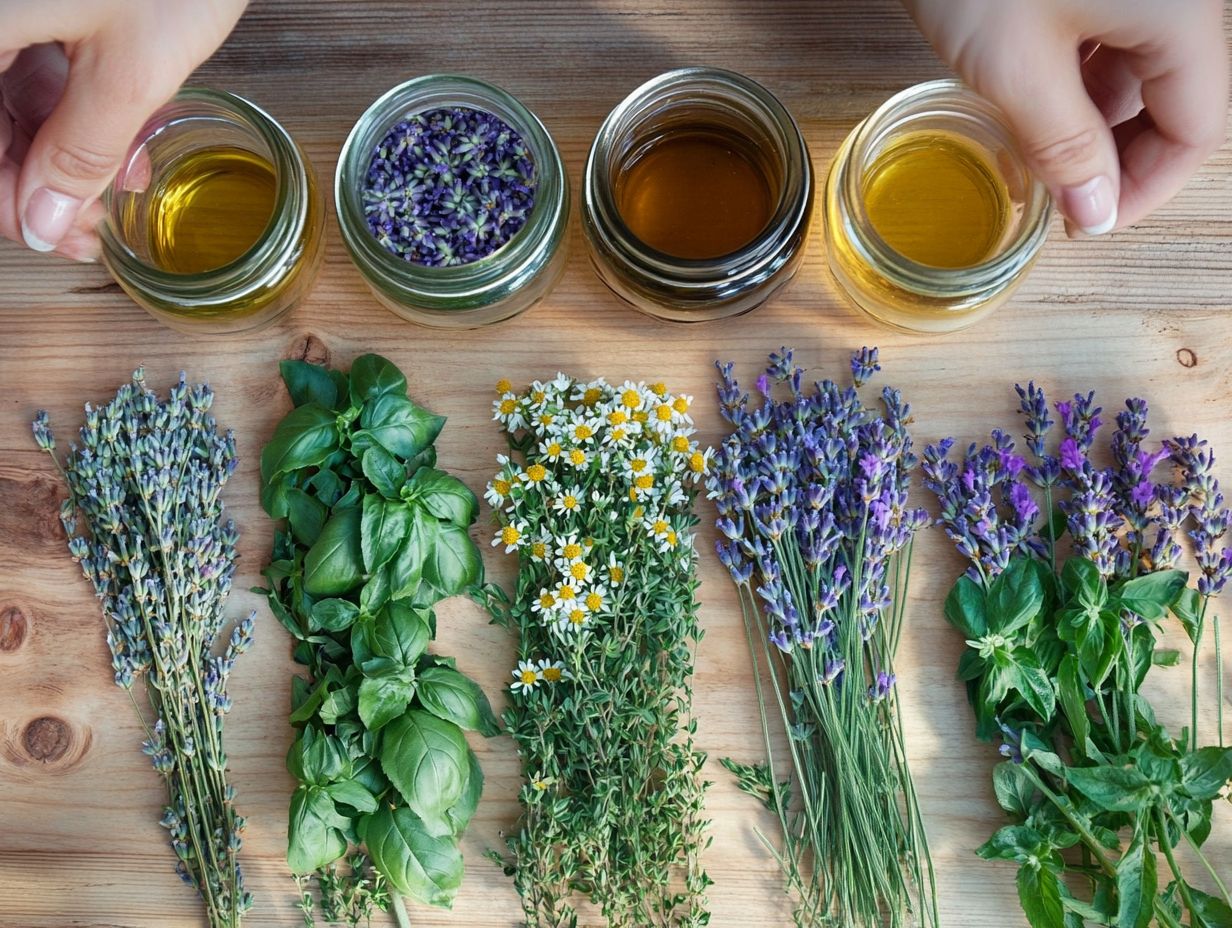
Natural remedies for mood swings offer a variety of options, from herbal medicine to lifestyle adjustments like exercise and nutritious eating. These approaches can play a crucial role in managing mood disorders such as depression and anxiety, providing safe and effective alternatives without the pesky side effects that often come with conventional treatments.
Take, for instance, herbs like St. John’s Wort and valerian root. St. John’s Wort is typically suggested in doses of 300 mg taken three times a day after meals. Valerian root can be enjoyed as a soothing tea or in capsule form, with a common dose of 300-600 mg taken before bedtime. Additionally, exploring using herbs for hormonal imbalance can further support your well-being.
Incorporating regular physical activity into your routine, even if it’s just a brisk 30-minute walk each day, can significantly boost your mood by releasing delightful endorphins. Nutrition also plays a powerful role in your mood; adding omega-3 fatty acids from sources like flaxseeds or walnuts can enhance your emotional well-being. Additionally, consider exploring 5 must-try herbs for stress management to further support your mental health.
Before diving into these remedies, it s essential to consult with healthcare professionals. This ensures you re on the path to safe and personalized treatment tailored just for you.
How to Incorporate Herbs into Your Routine
Get ready to transform your daily routine with herbs that can boost your mood! Incorporating herbs into your routine can be a transformative approach to managing mood disorders, such as depression and bipolar disorder. This practice offers a natural complement to mood supplements and other therapies.
It s essential for you to grasp the correct doses, methods of consumption, and potential interactions with other treatments. By understanding these factors, you can safely integrate herbal remedies like St. John s Wort and Kava Kava into your health regimen, enhancing your overall well-being.
Methods of Consumption and Dosage
Methods of consumption and dosage are paramount when utilizing herbal remedies like St. John s Wort and Kava Kava to effectively manage mood disorders. The way you choose to consume these herbs whether as teas, capsules, or extracts can significantly influence their effectiveness.
Each method comes with its own unique set of advantages and disadvantages. For instance, teas may offer a gentler approach, but you might need to use larger quantities to achieve the desired effects. On the other hand, extracts tend to be more concentrated and potent, yet they carry a higher risk of side effects if not used correctly. Capsules are convenient and provide consistent doses, although their bioavailability, or the amount that enters the bloodstream, may be lower compared to liquid forms.
Research indicates that the recommended doses for St. John s Wort typically range from 300 to 1200 mg per day. Meanwhile, Kava Kava dosages can vary depending on its preparation, often suggesting between 100 to 250 mg of kavalactones, the active compounds responsible for its calming effects. It s highly advisable to consult with healthcare providers before embarking on any herbal regimen; they can offer tailored recommendations based on your individual health profile and potential interactions with other medications.
Potential Side Effects and Interactions
Understanding the potential side effects and interactions is crucial when exploring herbal remedies for mood disorders. These factors can profoundly influence your overall mental health and well-being.
While many herbs, such as St. John’s Wort and Kava Kava, are often regarded as safe, it’s important to recognize that they can still have side effects or interact with other medications, especially for individuals managing anxiety disorders, seasonal affective disorder, or those taking mood supplements. Exploring the top herbs for managing stress effectively can also provide additional support.
Precautions When Using Herbs for Mood Swings
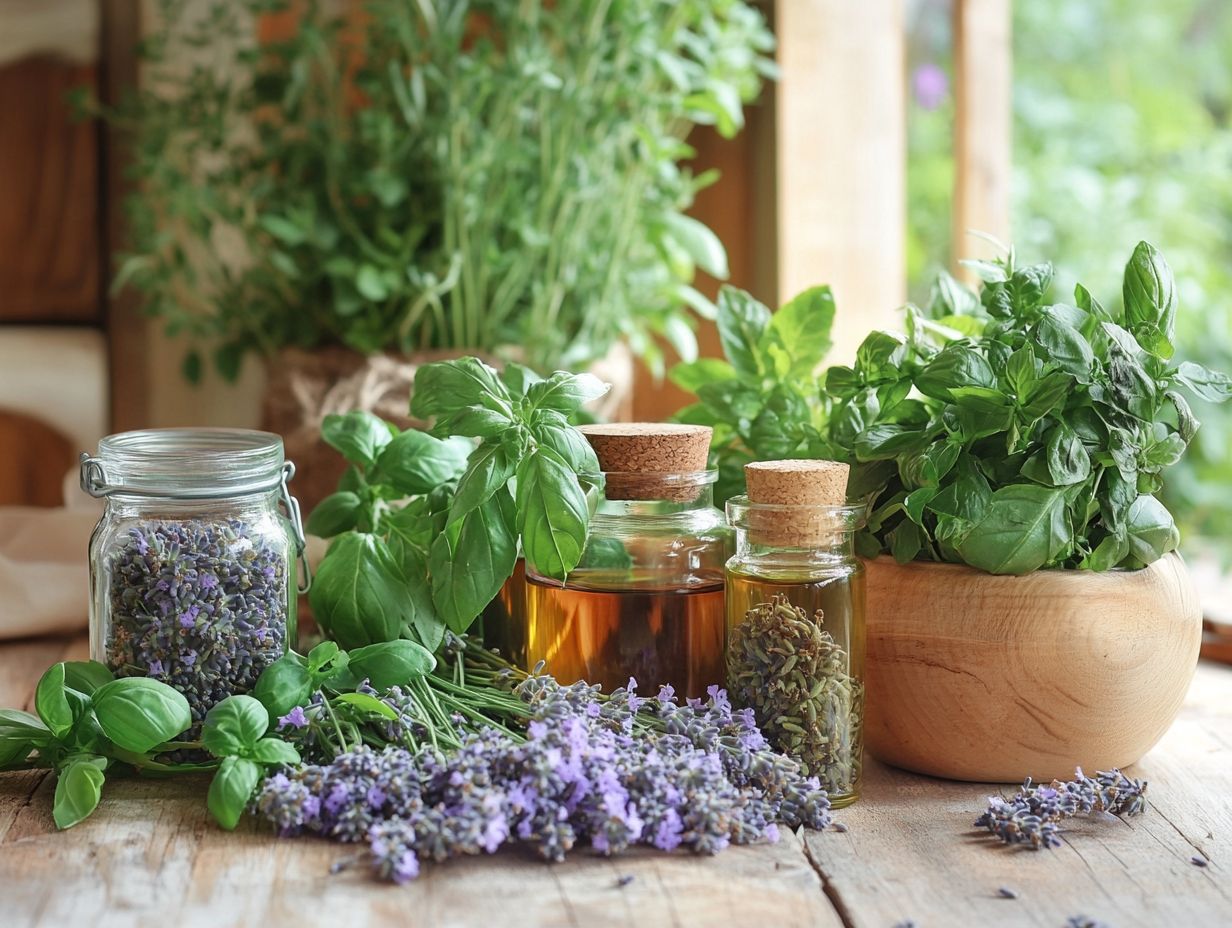
Taking precautions when using herbs for mood swings is essential for ensuring both safety and effectiveness in managing mood disorders like depression and anxiety. You should always consider your individual health conditions and any potential possible negative effects when selecting herbal remedies such as St. John s wort or Omega-3 fatty acids.
Before starting any herbal regimen, it s wise to consult with your healthcare provider to discuss your specific situation and any current medications, as interactions can happen. Staying vigilant in monitoring for any unexpected side effects is crucial, as these can differ from person to person.
Understanding your personal health history such as allergies, chronic conditions, and family medical backgrounds can significantly inform your choices.
By staying informed about the properties and effects of the herbs you choose to use, you ll enable yourself to make educated decisions that align with your wellness goals.
Combining Herbs with Other Treatments
Imagine boosting your mood management strategies with the power of herbs! Combining herbs with other treatments can elevate your mood management strategies if you’re navigating mood disorders like depression, bipolar disorder, or anxiety, offering a holistic approach to mental health.
Clinical trial evidence indicates that integrating mood supplements with traditional therapies can lead to enhanced outcomes, including the use of herbs for relieving stress-induced tension. This could mean a significant boost in your overall well-being.
Complementary Therapies for Mood Management
Complementary therapies for mood management can significantly enhance your mental health if you’re navigating mood disorders like anxiety and depression. By integrating lifestyle changes, exercise, and nutrition with herbal remedies, you can craft a well-rounded approach to improving your overall well-being.
This integration offers a holistic perspective on mental health, acknowledging that your emotional well-being is influenced by more than just medication.
Mindfulness practices, such as meditation and yoga, help cultivate present-moment awareness. This can greatly alleviate stress and boost your resilience.
Cognitive-behavioral therapy (CBT) complements these herbal interventions, equipping you with effective strategies to challenge negative thought patterns and build healthier cognitive frameworks.
Nutritional interventions further support brain health, ensuring your body is well-nourished to handle emotional fluctuations. All these therapies together create a synergistic effect that fosters mental balance, enabling you on your journey to wellness.
Frequently Asked Questions
What are some herbs that can help with mood swings?
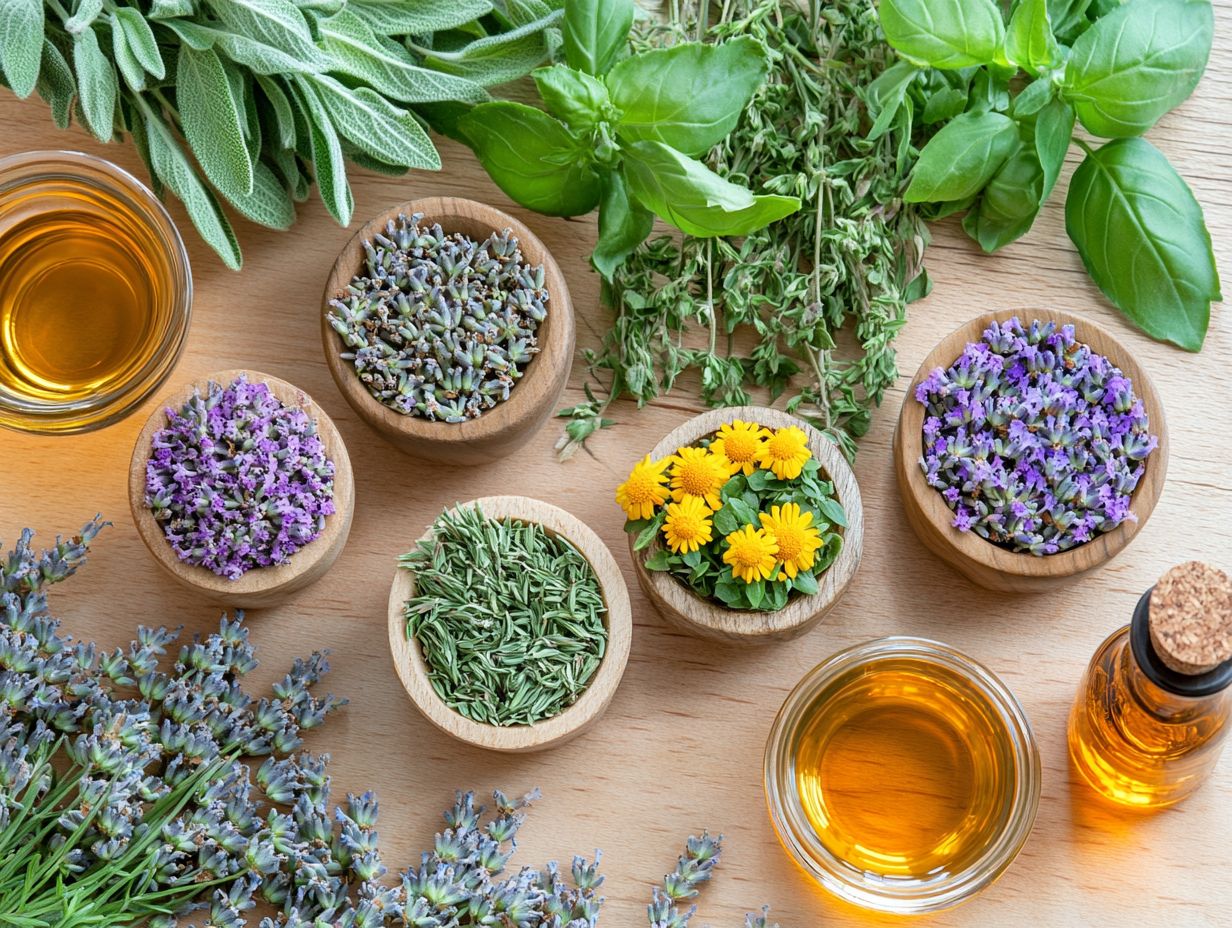
Some herbs that may help with mood swings include St. John’s Wort, Ashwagandha, and Rhodiola.
How does St. John’s Wort help with mood swings?
St. John’s Wort has been traditionally used to treat depression and anxiety, which can contribute to mood swings. It may help to regulate mood and improve overall emotional well-being.
Can Ashwagandha improve mood swings?
Ashwagandha is an adaptogenic herb that can help to regulate the body’s stress response, which may contribute to mood swings. It has also been shown to reduce anxiety and improve overall mood.
What is Rhodiola and how does it help with mood swings?
Rhodiola is an adaptogenic herb known for its ability to reduce stress and improve mood and cognitive function. It may also help to regulate hormones that can contribute to mood swings.
Can herbs interact with medication for mood swings?
Always consult with your healthcare provider before starting herbs. It’s crucial for your safety and well-being! Some herbs may interact with medications and cause adverse effects.
Are there any side effects of using herbs for mood swings?
While herbs are generally considered safe, they may cause side effects in some individuals. St. John’s Wort, for example, can interact with certain medications and cause sensitivity to sunlight. It is important to use herbs under the guidance of a healthcare professional.
Remember, taking care of your mental health is a journey. Seek the best path for you!

